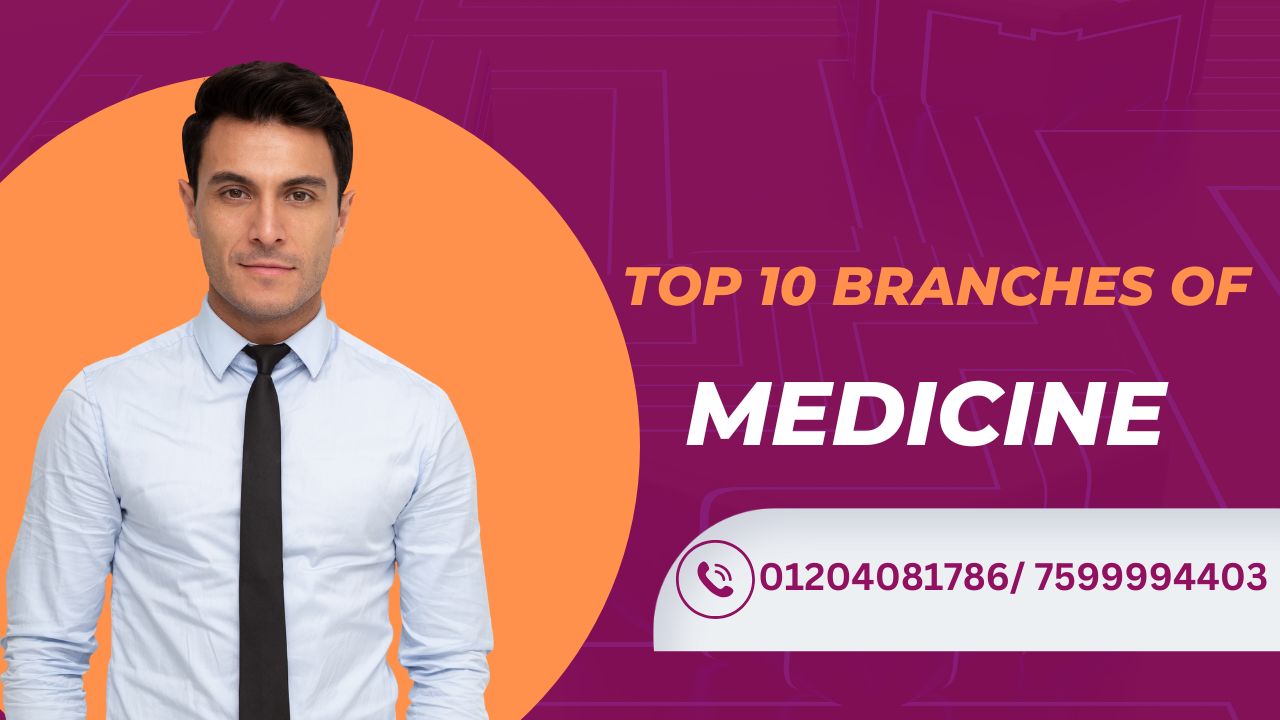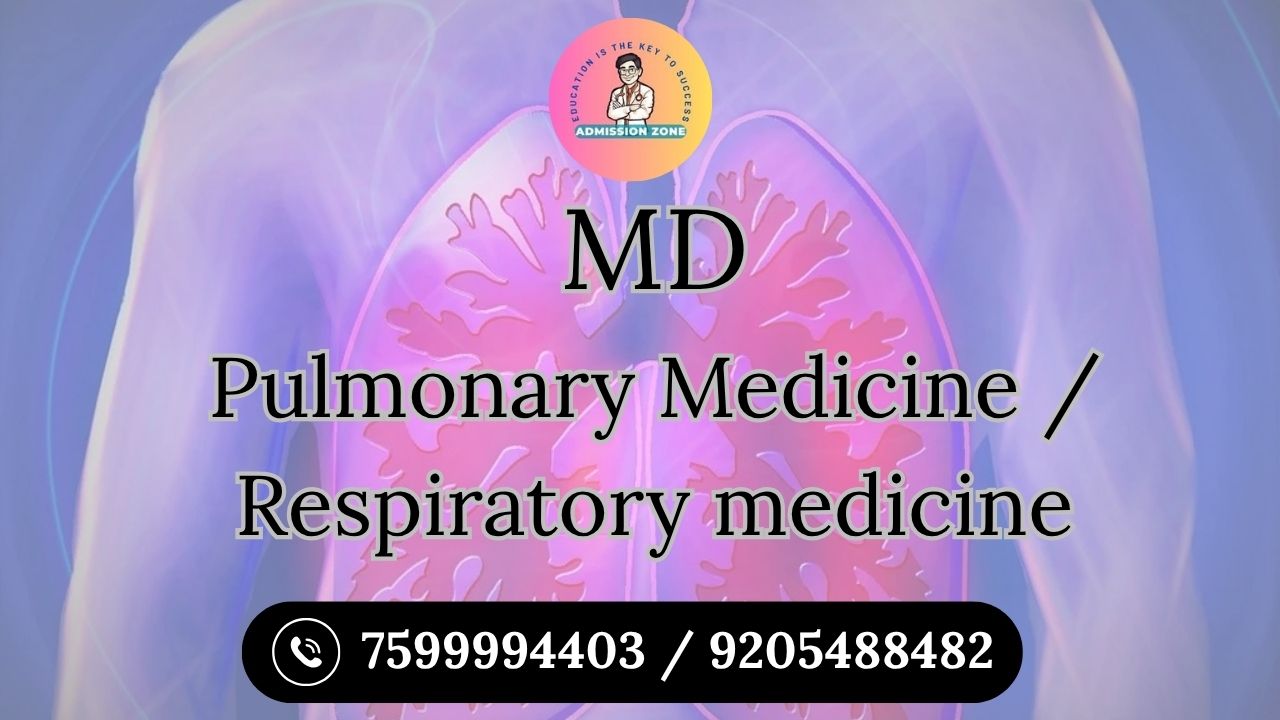
Medicine is a diverse field, further specialties courses focus on diagnosing, treating, and preventing diseases. Each branch of medicine has its own significance and importance for human health . Whether you are a student looking to choose a specialty or just someone curious about the different medical fields, this article will give you a comprehensive overview of the top 10 branches of medicine.
Top 10 Branches of Medicine
Top 10 Branches of Medicine
| Rank | Branch of Medicine | Description | Key Conditions Treated |
|---|---|---|---|
| 1 | Cardiology | Specializes in the diagnosis and treatment of heart-related diseases. | Heart attacks, arrhythmias, heart failure, hypertension, coronary artery disease |
| 2 | Neurology | Focuses on disorders of the brain, spinal cord, and nervous system. | Alzheimer’s disease, epilepsy, migraines, Parkinson’s disease, stroke |
| 3 | Orthopedics | Deals with the musculoskeletal system, including bones, joints, and muscles. | Fractures, osteoarthritis, scoliosis, joint replacement |
| 4 | Pediatrics | Concerned with the health and treatment of infants, children, and adolescents. | Respiratory infections, childhood obesity, asthma, genetic disorders |
| 5 | Oncology | Specializes in the diagnosis and treatment of cancer. | Breast cancer, lung cancer, leukemia, lymphoma, prostate cancer |
| 6 | Gastroenterology | Focuses on the digestive system, including the stomach, intestines, and liver. | IBS, GERD, Crohn’s disease, hepatitis, gallstones |
| 7 | Dermatology | Focuses on skin, hair, and nail diseases and conditions. | Acne, eczema, psoriasis, skin cancer, hair loss |
| 8 | Obstetrics and Gynecology (OB/GYN) | Specializes in women’s health, including pregnancy, childbirth, and reproductive health. | Pregnancy care, menstrual disorders, infertility, endometriosis |
| 9 | Psychiatry | Concerned with diagnosing and treating mental health disorders. | Depression, anxiety, bipolar disorder, schizophrenia, addiction |
| 10 | Endocrinology | Focuses on the endocrine system, dealing with hormone-related disorders. | Diabetes, thyroid disorders, PCOS, osteoporosis |
(1) Cardiology: The Heart of Medicine
Cardiologists specialize in diseases of the heart, blood vessels, and circulatory system. This field encompasses everything from routine checkups to complex procedures like heart surgeries and placements.
Key Conditions Treated:
- Heart attacks
- Arrhythmias (irregular heartbeats)
- Heart failure
- High blood pressure (hypertension)
- Coronary artery disease
Heart diseases are one of the leading causes of death worldwide. Cardiologists often work with patients suffering from lifestyle-related conditions such as obesity, diabetes, and high cholesterol.
(2) Neurology the Study of the Nervous System
Neurology focuses on the diagnosis and treatment of disorders related to the brain, spinal cord, and peripheral nerves. Neurologists deal with conditions like seizures, strokes, dementia, multiple sclerosis, and parkinson’s disease.
Key Conditions Treated:
- Alzheimer’s disease
- Epilepsy
- Migraines
- Parkinson’s disease
- Stroke
A neurologist may advise to conduct various tests, such as MRIs, CT scans, and lumbar punctures, to diagnose these conditions. Neurology is a highly specialized field, often requiring deep knowledge of both anatomy and complex clinical skills.
(3) Orthopedics: Bone, Joint, and Muscle Health
Orthopedics is the branch of medicine that deals with the musculoskeletal system, which includes bones, joints, muscles, ligaments, and tendons. Orthopedic surgeons specialize in treating conditions and injuries related to the bones, including fractures, arthritis, and sports injuries.
Key Conditions Treated:
- Fractures
- Osteoarthritis
- Sprains and strains
- Scoliosis
- Joint replacements (hip, knee, shoulder)
This field also includes pediatric orthopedics, where doctors treat musculoskeletal problems in children. Orthopedics deals with musculoskeletal disorders that can severely impact health.
(4) Pediatrics: Caring for Children
Pediatrics is the medical specialty that focuses on the health of infants, children, and adolescents. Pediatricians are responsible for diagnosing and treating conditions in young patients, from common illnesses to rare diseases.
Key Conditions Treated:
- Respiratory infections
- Childhood obesity
- Asthma
- Immunization and preventive care
- Genetic disorders
Pediatrics requires not only clinical skills but also the ability to interact with both children and their parents. Pediatricians need a compassionate approach, as children may not always be able to articulate their symptoms clearly.
(5) Oncology: The Battle Against Cancer
Oncologists specialize in diagnosing cancer, determining its stage, and selecting the most appropriate treatment options. This includes chemotherapy, radiation therapy, and in some cases, surgery.
Key Conditions Treated:
- Breast cancer
- Lung cancer
- Prostate cancer
- Leukemia
- Lymphoma
Oncologists also focus on palliative care, helping patients manage pain and other symptoms associated with cancer. Cancer care is multidisciplinary, and oncologists often work with other specialists like surgeons, radiologists, and pathologists to provide comprehensive care.
(6) Gastroenterology: Digestive System Health
Gastroenterology is the branch of medicine that focuses on the digestive system, including the stomach, intestines, liver, and pancreas. Gastroenterologists deal with conditions that affect the digestive and its associated organs. They are experts in managing disorders related to digestion, absorption, and excretion.
Key Conditions Treated:
- Irritable bowel syndrome (IBS)
- Gastroesophageal reflux disease (GERD)
- Crohn’s disease
- Hepatitis
- Gallstones
Gastroenterology often requires the use of advanced diagnostic techniques like endoscopy, colonoscopy, and liver biopsy. Given the prevalence of gastrointestinal diseases, this specialty is highly relevant in modern healthcare.
(7) Dermatology: Skin Health
Dermatologists are trained to handle skin , nails and hair conditions, from common conditions like acne to rare diseases like melanoma (skin cancer).
Key Conditions Treated:
- Acne
- Eczema
- Psoriasis
- Skin cancer (melanoma)
- Hair loss (alopecia)
Dermatologists use treatments ranging from topical creams to surgical interventions. This branch also includes cosmetic dermatology, which focuses on improving the aesthetic appearance of the skin.
(8) Obstetrics and Gynecology: Women’s Health
Obstetrics and Gynecology (OB/GYN) is a branch of medicine that focuses on female reproductive health. It includes both obstetrics, which deals with pregnancy and childbirth, and gynecology, which covers the health of the female reproductive system.
Key Conditions Treated:
- Pregnancy care
- Menstrual disorders
- Infertility
- Endometriosis
- Breast cancer
OB/GYN specialists also provide preventive care, such as breast exams, to detect early signs of disease. The field is ensuring reproductive health and women.
(9) Psychiatry Mental Health
Psychiatrists deal with conditions like depression, anxiety, schizophrenia, and bipolar disorder. Mental health is an essential part of overall health, and psychiatrists play a role in improving the quality of life for those struggling with mental health issues.
Key Conditions Treated:
- Depression
- Anxiety disorders
- Bipolar disorder
- Schizophrenia
- Addiction
Psychiatrists may use a combination of medication and psychotherapy to treat their patients. The field is in demand due to its increasing awareness of mental health and the demand for specialized care.
(10) Endocrinology: The Hormonal System
Endocrinology is the branch of medicine that deals with the endocrine system, which produces hormones that regulate some bodily functions. Endocrinologists specialize in disorders related to hormone imbalances, affecting metabolism, growth, and reproduction.
Key Conditions Treated:
- Diabetes
- Thyroid disorders
- Polycystic ovary syndrome (PCOS)
- Adrenal disorders
- Osteoporosis
Endocrinology has become important with lifestyle diseases like diabetes. Endocrinologists work closely with other specialists, including dieticians and surgeons, to help patients manage their conditions.

FAQs (Top 10 Branches of Medicine):
Ans. Choosing the right branch depends on your interests, aptitude, and skills
Ans. In most medical schools, you will first complete your basic medical education (MBBS), which covers general medicine. Afterward, you can choose a specialization during postgraduate training or residency.
Ans. Some of the most competitive branches include dermatology, orthopedic surgery, surgery, and cardiology.
Ans. Fields like dermatology and psychiatry often have more regular working hours, while specialties like surgery and cardiology may require long, unpredictable hours, especially for on-call duties.
Ans. General practitioners (GPs) are trained in general medicine and may handle basic healthcare needs, but to specialize in any of these branches, further education is required.
Connect with Us
Start your medical educational journey with the Admission Zone! Contact us today on 9205488482/ 7599994403 or WhatsApp us to explore a world of educational possibilities in the state and secure your admission to a brighter future.
Top 10 Branches of Medicine– Conclusion
Medicine is a field with a number of branches and aspects of health. Whether you are interested in diagnosing complex heart conditions, treating mental health issues, or focusing on women’s health, there is a specialization to suit each interest. Choosing the right branch of medicine is a highly personal decision that requires careful thought, as each field offers different challenges and rewards. With the right training, dedication, and passion, you can have your career in one of these branches, making a significant impact on the lives of patients and advancing healthcare.







